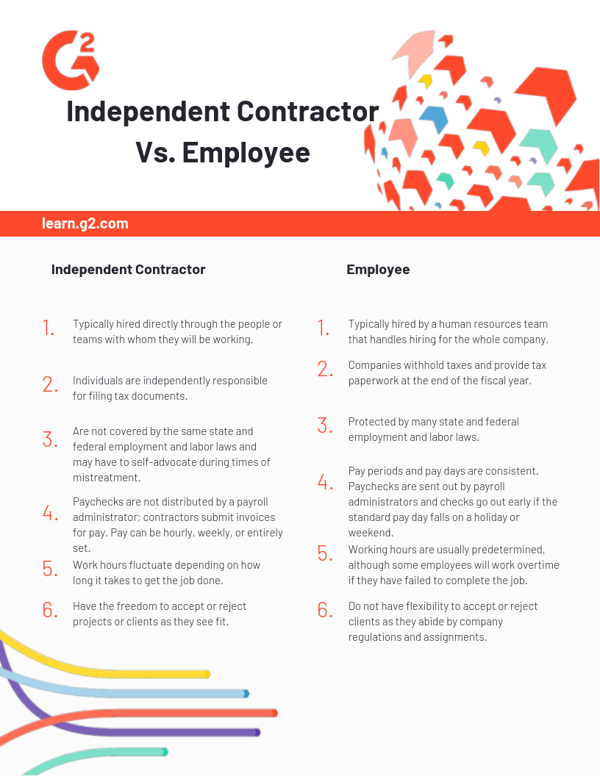An independent contractor and an employee may have the same job title, same wages, and the same responsibilities, but there are a lot of logistics behind their employment that aren’t the same at all.
If you’re trying to weigh the benefits and drawbacks of each employment style, look no further.
What is the difference between independent contractors vs employees?
There are a lot of similarities between these two employment types, but a few key differences make them stand apart. Employees have their taxes withheld by their employer, whereas companies do not withhold taxes for independent contractors. Employees are also protected by any relevant employment and labor laws, whereas independent contractors are on their own.
In this article, we’re going to go through the meaning and logistics of each, and hopefully help you determine which mode of income is best for you.
Independent contractors vs. employees
Independent contractors go back a lot longer than you may realize. While the rise of the digital and remote workforce is fairly recent, independent contractors as a concept are ancient.
Let’s take accounting as an example. We understand this as a modern role, wherein professionals use digital books and accounting software to help keep the numbers straight.

But did you know the first accountant dates back to the 15th century? Luca Pacioli was known as one of the world’s first bookkeepers in the year 1494.
So what exactly sets independent contractors apart from employees, and why should you consider it? Let’s discuss this literally ancient method and get you the information you need to decide what’s best for you.
What is an employee?
An employee is anyone who is beholden, on either a full-time or part-time basis, to one specific company. An employee can be paid hourly, or salaried for their work.
Employees are typically hired through the human resources department, which dutifully handles hiring and recruiting for the entire company. (See: Hiring and Recruiting Strategies Definition, and check out our recruiting automation software reviews)

One perk of being an employee is that in exchange for consistent work, companies withhold their employees’ taxes, and provide the proper tax documentation — a W2 form — at the end of the fiscal year. Many find this to be simpler than having to file all jobs manually.
Employees are also conveniently covered by a lot of state and federal employment and labor laws. This means employees are more empowered to take a stand against toxic work culture, unfair pay, etc.

Another benefit of being an employee is that pay periods are consistent. There is no waiting on a paycheck, or wondering if it’s going to be the correct amount. Many companies these days operate with direct deposit, so employees can expect for that money to go directly into their bank accounts.
This is all, of course, in trade for a higher level of commitment to one company and one role. Employees have set hours, set responsibilities, and set pay. For many, the consistency is appealing and a huge factor in the decision.
For others, this lifestyle is not the right choice.
What is an independent contractor?
An independent contractor is hired for their services over a set amount of time, or until the completion of a predetermined project, such as the renovation of a basement, or the completion of a website.
Independent contractors do not have to go through the same hiring process as employees. Often, independent contractors are hired directly by the people and managers they will be working for.
The style of pay for an independent contractor is agreed upon with the other party. Some are given a set amount of money for the completion of the full project. Others are paid hourly, daily, or weekly. This, in itself, has its advantages and disadvantages.
Work can sometimes take more or less time than anticipated. If a contractor is paid hourly, a quicker job results in less pay. A lengthier job than anticipated may result in more pay, but it could also leave you with unhappy customers whose invoices are higher than they were quoted.
Independent contractors are paid after they submit invoices detailing the work they did. Because a payroll team is not in charge of sending out paychecks, independent contractors are sometimes paid late and may have to bother employers to remind them to get their money sent out in a timely manner.
This is not true of all places. A part of the independent contractor life is, unfortunately, being a good judge of character and determining who will be good to work with.
As for tax paperwork, an independent contractor fills out a W-9. It is up to the contractor to fill out their name, address, taxpayer identification number, and certifications about backup withholdings.
Independent contractors also have to report on any payments at or over the amount of $600 in a calendar year on a 1099 form.
Miss Independent
Now that you know the difference between an independent contractor and an employee, you have a good starting point to decide which style of work is best for you.
If you want more information on unconventional work styles, check out my article on What Is Freelance?


 by Amal Joby
by Amal Joby
 by Holly Landis
by Holly Landis
 by Mara Calvello
by Mara Calvello